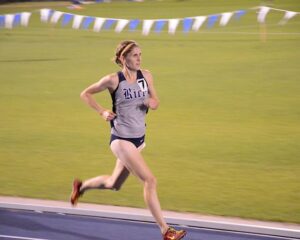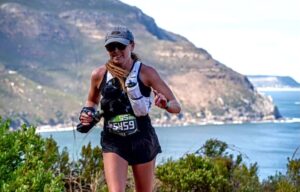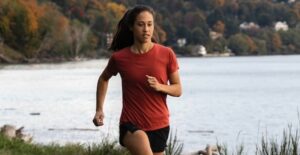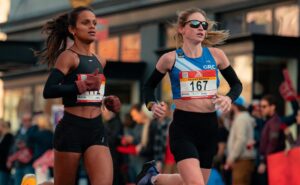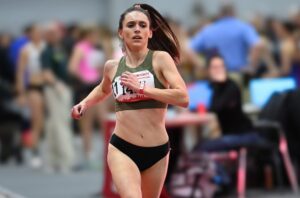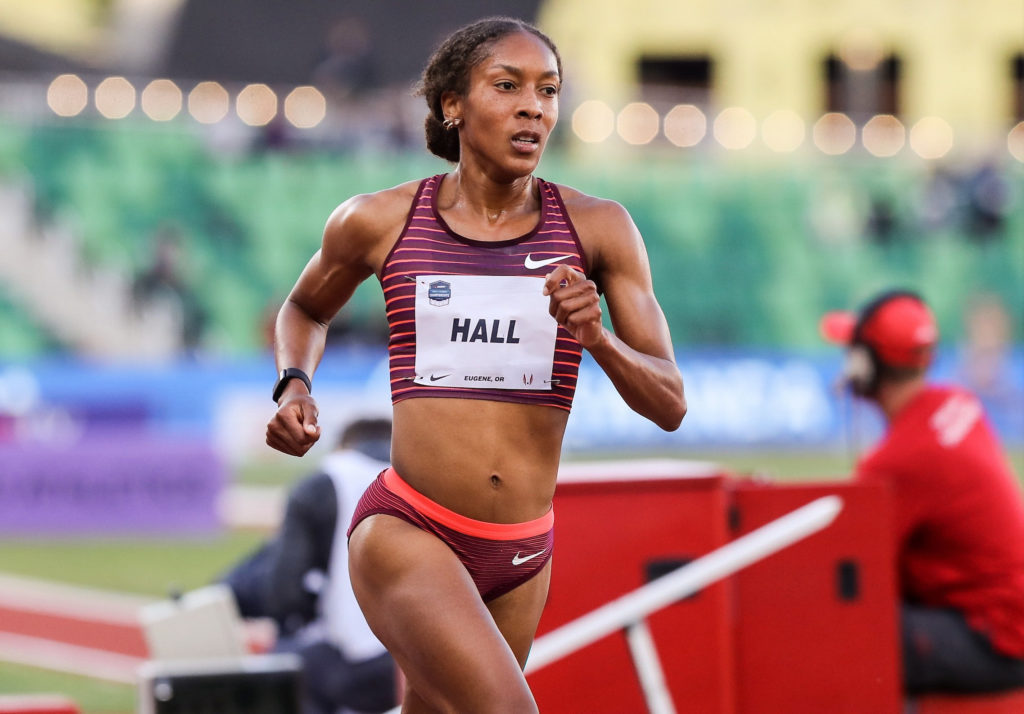
By Alison Wade
About halfway through last month’s Falmouth Road Race, the leaders made a break. Marielle Hall, who had been running in the lead pack, temporarily dropped to seventh place, but then she regrouped and began working her way back up through the field. She finished third behind Keira D’Amato and Edna Kiplagat and covered the 7-mile course in 36:44—on a day more suited for going to the beach than running a road race.
While Hall, 30, would like to get to a place where she can go with the break and contend for the win, the race was an encouraging sign that she’s on the right track after moving across the country and switching coaches a year ago.
Fast Women caught up with her last week, coming off an exciting couple of days in which she attended fellow pro runner Angel Piccirillo’s wedding and then watched Serena Williams win her opening-round match at the U.S. Open, before getting ready to go to altitude camp. Hall is a big tennis fan, thanks in part to the Williams sisters. Watching Serena on Monday night and seeing all the support she has now, after all she has been through, moved Hall to tears.
“It’s just cool to see how many people she brings together with something so simple that she started as a kid,” she said. “It becomes larger than life, which is crazy.”
New coach and a new home
Last September, Hall announced that she was leaving the Bowerman Track Club after four years. She moved from Portland, Oregon, to Providence, Rhode Island, to be coached by Kurt Benninger, who is married to pro runner Molly Huddle. Hall felt the change was necessary, but starting over in a new place wasn’t easy.
“Throughout their careers, Molly and Kurt have been really great mentors for a lot of people, not just on the professional circuit but also elite athletes and people who are in school, working, and trying to get the best out of themselves,” she said. “I feel reminded of that constantly. They’re good people to be around, people that I trust will help make an investment in [helping me get] better. But it doesn’t make it any easier to uproot yourself and change everything.”
There wasn’t one specific moment that led Hall to believe she needed a change, just a feeling that built over time. Her last race for the Bowerman Track Club was the 10,000m at the U.S. Olympic Track & Field Trials in June 2021. Five years after finishing third at the 2016 Trials and making the Olympic team, she placed 36th out of 37 finishers, in 34:35.79. It was a performance that in no way reflected the work she put into performing well that day.
“I overcooked myself and I think there were just a lot of different circumstances, coming from the pandemic, where you felt like running was an outlet for so many things,” Hall said. “And it also felt like this opportunity where if you leveraged it right, you could really create an advantage for yourself competitively. I really felt pressure from that, to turn this really hard and terrible year into an opportunity.”
As hard as she tried, she could not. As it did for many, living through a pandemic and the country’s simultaneous racial reckoning took a major emotional toll. (Hall wrote two thought-provoking pieces for Runner’s World at the time.) Combine that with a heavy training load, and her body stopped working the way she expected it to.
She later felt disappointed in herself that she didn’t have the self awareness or confidence to recognize that something wasn’t right and make a change sooner. “You want to do everything that you can to get the best out of yourself, but to ride that line too long [and] you’re just going to get injured or burn yourself out,” she said.
Hall’s struggles in 2020 carried over into 2021. And as many athletes do, she found herself pushing through things she normally wouldn’t, were it not an Olympic year. And, she said, part of the goal in being a member of the Bowerman Track Club was not only working to better herself, but also helping her teammates better themselves. “I just felt like I was fried in all types of ways,” she said. “It’s not just the training aspect. You live with everyone, too. I wasn’t in a place to contribute to the environment on a physical level or on an emotional level. It would have made my life a lot more simple if that’s what I could have done.”
In one of Hall’s last workouts before the Olympic Trials, she developed a high hamstring injury. Imaging indicated she hadn’t torn it completely, but there was some scar tissue buildup. And that led to some foot problems as well, which lasted into the winter of 2022. As Hall has returned to training, it’s been a process learning to trust that her body can handle the training again. “You become a little bit scared of the training, which is a weird place to be, because you’re used to being aggressive and attacking the work and enjoying it,” Hall said. “But when you get injured, when you overtrain, it is really kind of learning how to trust the work that you’re doing again, and trust that you can work hard and come back from it.”
Rebuilding
Benninger has been bringing Hall along slowly since her move to Rhode Island. For a while, he cut out her long run and had her run only once a day. As she has been feeling better, she has gradually added those elements back into her training. And she’s looking forward to doing a more traditional buildup as she prepares to race her first half marathon this fall. She isn’t yet sure where she’ll make her debut, but she’s considering the B.A.A. Half Marathon (November 13) and the Philadelphia Half Marathon (November 19). And the race will help her assess which direction she might go in the future.
While Hall plans to do more racing on the roads going forward, she’ll also continue racing on the track for at least the next year, partially because she thinks she needs that kind of speed and sharpness to run well on the roads.
Since moving to Providence, Hall has done a lot of her training alone. Benninger coaches a group of post-collegiate runners and sometimes Hall will overlap with some of the men during a workout. More recently, she’s been doing some of her easy running with Emily Sisson, who is in town for her Chicago Marathon buildup, and Huddle, as she returns to running after giving birth in April.
More often than not, Hall runs alone, a big change from her Bowerman Track Club days. “Just being able to share a workload, there is a huge benefit to that,” she said. “But I also feel like it’s been beneficial to my development as an individual athlete to be able to find pace by myself and figure out how to sustain a rhythm. It’s different from just tucking in and absorbing the energy from other people.” She said she has always known she needed to work on setting her own pace, so although it’s tough, she doesn’t mind being in a place where she is forced to do it.
And over time, she’s seeing progress. “It’s been a really slow build just in terms of everything—training, having people to run with—but it feels like it’s coming together,” she said.
Moving up
For now, she has her sights firmly fixed on her half marathon debut, and she’s trying not to think too far beyond that. But the marathon is in the back of her mind, even though she doesn’t yet have a sense of when she’ll make her debut. Hall knows that if she wants to try out the marathon during the current Olympic cycle, there’s not much time left. “I’m mostly just fixated on finishing off this year with some momentum and kind of seeing where that leads,” she said.
Hall has learned more about Marilyn Bevans, the first Black American woman to break 3:00 in the marathon, and Olympic marathoner Ted Corbitt, in recent years. And she’s aware of the list that Gary Corbitt, Ted Corbitt’s son, keeps of the fastest American-born Black female marathoners. Samia Akbar tops the list with a 2:34:14, a time Hall is likely to be capable of surpassing. She has been following Knox Robinson and the women he’s been coaching through Black Roses NYC.
Hall laments the fact that she didn’t learn more about Bevans and Corbitt growing up, but she’s glad to be learning about them now. And she’s looking forward to following the Black Roses and others through their fall marathon season. “I’m excited about that community and I want to be friends with them more than I want to go and crush the time lists,” Hall said. “I’m motivated not just by their results but by the community that they’ve built for themselves and standards that they’ve created for themselves.”
Regardless of when Hall makes the jump to the marathon, her running is back on the right track, and her story is far from complete.


